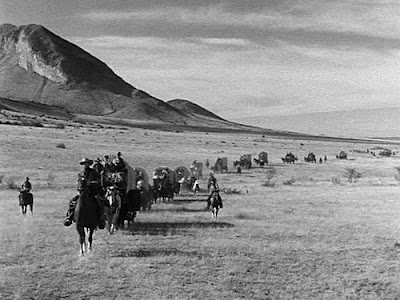In accordance with the well known legend of Leap Day William, stipulating that once every four years on February 29 you have "a magical extra day...to do the things you ordinarily wouldn't do, to take chances!", I took a chance on February 29, 2012 by watching one of the classics starring that infamous late actor known as The Duke that I have long avoided because, frankly, I can't much stand him. How, oh how, did it pan out?
Whereas Kelly Reichardt's recent "Meek's Cutoff", a film I cherished, despite its wagon train journeying through the expansively photogenic western frontier, explicitly went for a look that closed off and boxed in the viewer, Howard Hawks' legendary 1948 western opus "Red River" goes for a look that opens wide and encompasses all, breathing in and letting the viewer linger on the brilliant vistas and non-CGI cumulus clouds. And when the cattle drive that is the story's focal point reaches the stretch of water that provides the film its title, those non-CGI cattle really charge right into that non-CGI water. It's all gloriously throwback.
In the midst of a wagon train to Texas, hardscrabble Tom Dunson (John Wayne) breaks off with his pal Groot (Walter Brennan) with the intention of starting his own cattle ranch and sending for his best gal (Colleen Gray) when things are square. Alas, the wagon train is attacked by indians, his best gal is killed and a lone survivor, young Matt Garth (Mickey Kuhn), is taken in my Dunson and Grote who take him across the Red River into the Lone Star State where they take a section of land that isn't theirs for themselves, fourteen years pass in fourteen seconds, Mickey Kuhn ages into Montgomery Clift, and Dunson has established the most impressive ranch this side of Southfork. But the end of the Civil War has brought hard economic times south of the Mason Dixon and no one can afford Dunson's plethora of beef. Thus, they must drive the cattle "to Missouri" in the hopes that there the herd can fetch a proper price.
As it must, the cattle drive faces a bounty of hardship. A chuckwagon is lost. A sugar thief gets his come-uppance. A man gives a loving speech about his wife and what he plans to do with his wages once the drive is done and then he......well, you can figure that one out. The men want to avoid Missouri where rumors of raiding indians abound and make for Abilene, Kansas instead where a savior in the form of a railroad may or may not exist. Things go from bad to dreadful. Dunson refuses to sleep, hits the whiskey hard and gets hydrogen psychosis (the crazy-eye!) and the men turn on him and Matt takes command. He will drive the cattle to Abilene and leave Dunson behind. Dunson promises to come after Matt and kill him.
It's not unlike a more western-styled "Gangs of New York" with Dunson as Bill the Butcher and Matt as Amsterdam Vallon, the mentor vs. the protégé. And the onscreen dynamic is heightened by the offscreen dynamic, Clift's Methodness vs. Wayne's Naturalism (read: he's just John Wayne). The night before the cattle drive begins there is a scene in a saloon where all the men are drinking and playing cards and b.s.-ing and this feels natural and then Dunson enters and everything stops and everyone shuts up and he gives a speech. That's about all Dunson ever does - give speeches. John Wayne didn't have dialogue. He had rhetoric.
"Ten years and I'll have the Red River D on more cattle than you've looked at anywhere. I'll have that brand on enough beef to feed the whole country. Good beef for hungry people. Beef to make 'em strong, make 'em grow. But it takes work, and it takes sweat, and it takes time."
Dunson, I think, is meant to be "complicated", so stubborn he fails to see his foolhardy judgment. My eyes saw someone entirely uncomplicated, a zealot who if he told you to eat cow dung for breakfast would darn well expect you to do it and not ask questions. He's gonna kill that sniveling Matt, by God, if it's the last thing he does, which, in his mind, it won't be because he's right. Until......
For 90 minutes the movie strides along when suddenly Matt and his gang encounter a wagon train under attack and swoop to the rescue so Matt can fall in love with Tess (Joanne Dru), a name which, of course, means "Deus ex machina" in Svenborgian. She crudely helps to advance the plot, hammer home the (already quite apparent) theme of Father & Son and then, in one of the most egregious endings in a so-called great movie I can recall, right at the moment when our two main characters are locked in a vicious struggle of life and death, she bustles in to scold them like a schoolteacher and supply the pot of gold at the end of the rainbow. It's grotesque!
The conclusion of "Meek's Cutoff" may lack closure but is completely logical from the style and shape of the story. The conclusion of "Red River" has closure but is completely illogical from the style and shape of the story. (Reader: "Wait, is Nick claiming 'Meek's Cutoff' is - gasp! - 'better' than 'Red River?'" Nick: "Talk amongst yourselves.")
Leap Day William can bite me.
Friday, March 02, 2012
Subscribe to:
Post Comments (Atom)






2 comments:
Well, this looks to be a right conundrum. Clift, whom I love, in a film with Wayne, whom I loathe in a genre I have no real opinion on.
Is it weird I've never heard of this movie?
Montgomery Clift is good in it. I mean, of course he is! He's Clift! But still......
It's regarded as a classic western but if you don't like westerns and you don't like Wayne, it probably doesn't show on your radar.
Post a Comment